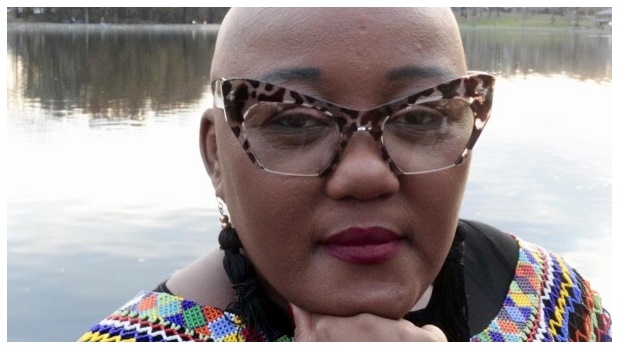
Each morning Sizakele Mdluli-Chaplin noticed the patches growing bigger and bigger, the hair falling out faster and faster.
“The skin on my face was also becoming discoloured and no one could tell me what was wrong,” she says. Sizakele (now 37) sought medical help and a battery of tests was performed but doctors all told her the same thing: there was nothing wrong with her. She was fine. “But my hair was still falling out,” she tells us.
“Some of the doctors associated the hair loss with high stress levels and others said it was because of my hairstyles but I hadn’t braided my hair for about two years.” Sizakele was eventually diagnosed with alopecia, an autoimmune condition that causes the body’s immune system to attack it – in her case, her hair follicles.
READ MORE: Jada Pinkett-Smith undergoing steroid treatment to deal with hair loss
Although stress can exacerbate the condition in some cases it’s widely thought to be genetic – and there’s no lasting cure. With specialist treatment hair does sometimes grow back but there’s no guarantee it won’t fall out again.
Sizakele decided to turn her struggles into something positive and wrote about her hair loss hell in a book she hopes will bring hope and inspiration to other people living with alopecia.
Enough Already is already out in the U.S., where she now lives with her American husband, and is set to be released in SA next year. “I give practical tips on how to manage the condition, overcome the stigma of baldness and live a happy life. “It’s also about my dating life – because that’s a big thing for people with alopecia. We feel no one will love us without hair. We feel like we’re ugly so how can people see us as beautiful?”
But everyone has beauty, she says – it’s all about coming to terms with who you are.
READ MORE: My hair started falling out at 8 years old but I’m done covering it up
Sizakele says she has never had thick hair and as a child was bullied because of her thinning tufts. “It became a target for kids to pick on me,” says Sizakele, who was raised in KwaMashu near Durban. “I thought it was normal and my hair would grow thicker after treatments or if I gave it a break from various hair-pulling styles.”
But it never did – in fact, it became even thinner as she grew up. And Sizakele, who is an environmental health graduate from the Mangosuthu University of Technology, was devastated when her condition finally got a name and she found out there was little she could do about it. Her skin condition is also the result of an autoimmune condition, which affects the pigment, but it was knowing her hair – her crowning glory – was compromised that affected her most. “
For women feeling beautiful is a need,” says Sizakele, chatting to DRUM from her home in New Jersey in the U.S.
“They want to look at themselves in the mirror and feel attractive. When they lose their hair, their self-esteem is also affected.” Added to this is the fact hair loss is often associated with conditions such as HIV and cancer and “there is stigma involved”.
READ MORE: 7 reasons why your hair is not growing
Sizakele’s fear and frustration “led me down a very dark path. I started having insomnia and my anxiety levels skyrocketed. I was depressed and contemplated suicide. I was afraid of what the future held for me. Who would love or even marry a woman without hair?”
Her mental health deteriorated and she was hospitalised for psychiatric evaluation and counselling after she became suicidal.
“I was in City Hospital in Durban for a couple of months before I was officially given the alopecia diagnosis. I was experiencing a lot of anxiety and was weeping most of the time because I couldn’t come to terms with what was happening to my hair.”
Finding out she had alopecia – that her condition actually had a name – was almost a relief and she resolved to find out as much as she could about it. Enough already with the misery and uncertainty, she said – she was going to overcome this. Enough Already became the title of her book, which details her difficult journey with alopecia and how she overcame the stigma associated with the disease.
READ MORE: How to spot the signs and help a friend who's battling with mental health issues
Sizakele has also proved baldness is no obstacle to finding love. She met her husband, Leonard J Chaplin, a pastor at A New Generation of Promise Church in America when she moved to the US to study for her master’s degree in international relations and diplomacy in 2015. They fell head over heels and she has now embraced the church. “I’m serving as the first lady of the church now,” she says.
The couple do not have kids yet, but, Sizakele tells us she’s “not worried about passing the condition to my [ future] children because alopecia is not hereditary. “My husband does not have the condition, so chances are if both parents do not have it the children may not get it. It varies with every individual”.
Sizakele rocks wigs, scarves or hats when she goes out but embraces her baldness at home. She is “60% bald”, she tells us, and what hair she has doesn’t grow beyond two centimetres long so she keeps her head shaved. “I’m a pastor’s wife so I am expected to cover my head when I’m in the church. So I wear wigs and things in public but when I’m at home I walk around bald without a care in the world.
READ MORE: Why opting for wigs over weaves means you're right on track
Even after all these years she still finds it hard to be stared at on the odd occasion she goes out without any covering on her head. “It is still not seen as ‘normal’ for women to be bald. Baldness is usually associated with sickness and ageing, so you can understand when young people with alopecia feel ashamed of being bald.” But she knows she should be grateful she doesn’t have a life-threatening condition.
“Alopecia may not be welcome but it isn’t fatal – it’s just, nothing worse.” Yet in the next breath she says it hurts when people are quick to dismiss alopecia because it “isn’t that serious”. “Yes, the condition might not be fatal, but some people die slowly on the inside – from shame – and some even commit suicide because they can’t stand the bullying that comes with being bald.”
Sizakele’s message for others who have alopecia is to learn about the condition before it gets out of hand. “Consult a dermatologist, get treatment early and find support groups for the emotional strain you’re going through. “And most importantly, you must remember your hair does not define who you are – you are enough and you are beautiful.”


















